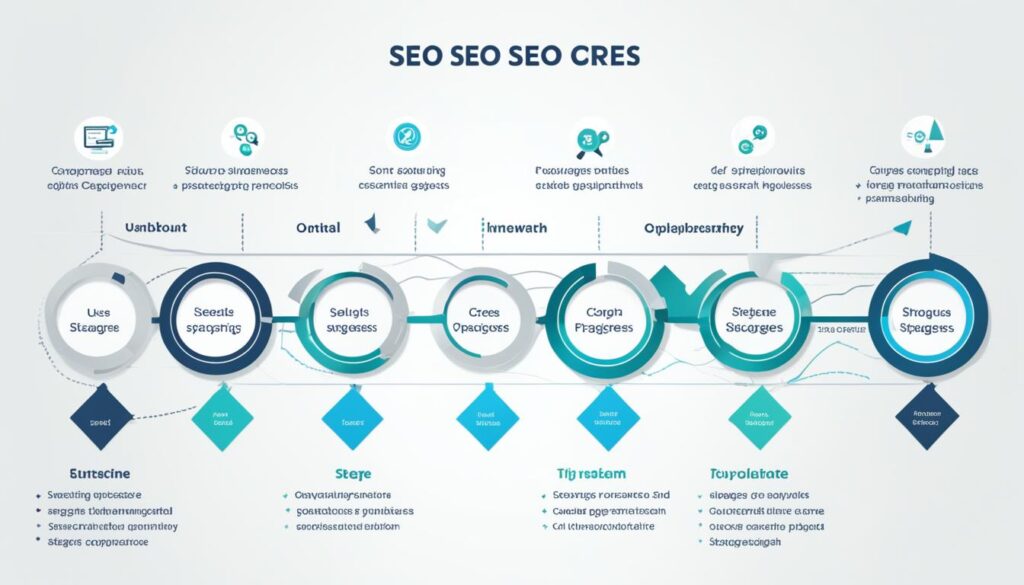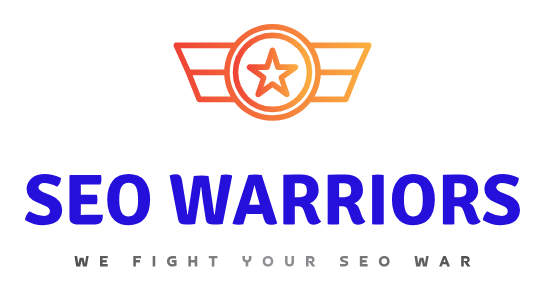In order to achieve success in search engine optimization (SEO), it is essential to understand and follow the four key stages. These stages encompass the foundation of SEO, the power of SEO tools, staying current with industry trends, and mastering technical SEO.

Key Takeaways:
- Understanding the four key stages is crucial for SEO success.
- Building a strong SEO foundation lays the groundwork for optimization efforts.
- Harnessing the power of SEO tools enhances optimization strategies and decision-making processes.
- Staying on top of industry trends ensures competitiveness in the ever-changing SEO landscape.
- Mastering technical SEO optimizes website architecture and improves rankings.
Building a Strong SEO Foundation
In order to achieve success in search engine optimization (SEO), it is crucial to establish a solid foundation. This stage forms the bedrock of SEO knowledge, allowing marketers to navigate the intricate world of online visibility and rankings with confidence.
Fundamental Concepts of SEO
Understanding the fundamental concepts of SEO is paramount to building a strong foundation. This involves grasping key elements such as keyword research, on-page optimization, link building strategies, technical SEO, and search engine algorithms.
By delving into these concepts, marketers can unlock the power to effectively optimize their websites, boost organic traffic, and elevate their online presence.
Keyword Research: The Building Blocks
Keyword research is the cornerstone of SEO. It involves identifying relevant keywords and phrases that potential customers use when searching for products or services online. By integrating these keywords strategically into website content, marketers can significantly improve search engine rankings and attract targeted traffic.
Maximizing On-Page Optimization
On-page optimization focuses on optimizing individual web pages to improve organic visibility and attract qualified traffic. Key on-page elements include meta tags, headings, image alt text, URL structure, and keyword placement. Adhering to best practices for on-page optimization ensures that search engines can effectively crawl, index, and rank web pages.
Powerful Link Building Strategies
Link building remains a crucial component of SEO success. By acquiring high-quality backlinks from reputable websites, marketers can boost their website’s authority, credibility, and visibility. Engaging in strategic link building tactics, such as guest blogging, content promotion, and influencer outreach, can pave the way for increased organic traffic and improved search rankings.
Cracking the Code of Technical SEO
Technical SEO comprises the technical aspects of website optimization that affect search engine crawling and indexing. This includes optimizing website architecture, XML sitemaps, page speed, structured data markup, and mobile responsiveness. By mastering technical SEO, marketers ensure that their websites are optimized for optimal crawlability, user experience, and search engine rankings.
Understanding Search Engine Algorithms
Search engine algorithms are ever-evolving, making it essential for marketers to stay abreast of the latest updates and changes. Understanding how algorithms work and what factors influence search engine rankings allows marketers to adapt their strategies accordingly.
To summarize, building a strong SEO foundation involves delving into the fundamental concepts of SEO, including keyword research, on-page optimization, link building strategies, technical SEO, and search engine algorithms. Marketers who establish this solid groundwork can lay the groundwork for successful SEO campaigns and drive organic growth for their businesses.
Harness the Power of SEO Tools
Once you have built a strong foundation in SEO, it’s time to leverage the power of SEO tools to enhance your optimization efforts. These tools provide valuable insights, track website performance, conduct competitor analysis, and enable data-driven decision-making. Let’s explore some of the industry-leading SEO tools that can take your optimization strategy to the next level:
1. Google Analytics
Google Analytics is a powerful tool that allows you to monitor website traffic, user behavior, and conversion rates. By analyzing data such as bounce rates, session durations, and page views, you can gain valuable insights into how visitors interact with your website. This knowledge enables you to make data-driven decisions and optimize your website accordingly.
2. Google Search Console
Google Search Console provides essential data about your website’s performance in Google search results. It allows you to monitor your website’s presence in search, identify indexing issues, and track keyword rankings. By leveraging this information, you can optimize your website’s visibility and improve its organic search performance.
3. SEMrush
SEMrush is an all-in-one SEO tool that offers a comprehensive suite of features, including keyword research, competitor analysis, backlink audits, and rank tracking. With its extensive database and advanced analytics, SEMrush provides valuable insights to help you optimize your website and outrank your competition.
4. Moz
Moz is a leading SEO software provider that offers a range of tools to improve your website’s search engine visibility. From keyword research and link building to site audits and rank tracking, Moz provides the necessary tools to optimize your website’s performance and drive organic traffic.
5. Ahrefs
Ahrefs is another top-tier SEO toolset that specializes in backlink analysis and competitor research. With features like site explorer and content explorer, Ahrefs allows you to uncover link building opportunities, analyze competitor strategies, and optimize your website’s backlink profile for better search rankings.
By harnessing the power of these SEO tools, you can gain valuable insights into your website’s performance, track keyword rankings, conduct competitor research, and make data-driven decisions to optimize your online presence. Let’s move on to the next stage of SEO where we explore how to stay on top of industry trends.

Stay on Top of Industry Trends
Staying up-to-date with the latest industry trends is a crucial factor in maintaining a competitive edge in the ever-evolving world of SEO. Search engines are constantly refining their algorithms, and as an SEO specialist, it is essential to stay on top of these changes to ensure continued success. By staying informed about emerging trends, algorithm updates, and innovative strategies, you can adapt your optimization techniques to meet the evolving needs of search engines and users.
Continuous learning is key in the field of SEO. By following trusted SEO blogs, you can gain valuable insights from industry experts and learn about the latest best practices. Some popular SEO blogs to follow include Moz, Search Engine Land, Backlinko, and SEMrush Blog. Engaging with online communities, such as SEO forums and social media groups, provides opportunities to connect with other professionals, exchange ideas, and stay updated on the latest industry news.
“By embracing emerging trends, algorithm updates, and innovative strategies, SEO specialists can maintain a competitive edge.”
Participating in industry conferences and webinars is another effective way to stay abreast of industry trends. These events offer the opportunity to learn from industry leaders, gain in-depth knowledge about emerging SEO techniques, and network with like-minded professionals. Some renowned SEO conferences and webinars include MozCon, BrightonSEO, and the Search Marketing Expo (SMX) series.
It’s important to note that industry trends go beyond technical SEO. As search engines increasingly prioritize user experience, understanding user behavior and preferences becomes essential. Additionally, keeping an eye on emerging digital marketing trends, such as voice search optimization and mobile-first indexing, can provide valuable insights into the future direction of SEO.
Algorithm Updates and Their Impact
Search engine algorithm updates can significantly impact SEO strategies and rankings. It’s crucial to monitor these updates and adapt your optimization techniques accordingly. Here are some notable algorithm updates in recent years:
| Algorithm Update | Release Date |
|---|---|
| Panda | February 2011 |
| Penguin | April 2012 |
| Hummingbird | August 2013 |
| Mobilegeddon | April 2015 |
| RankBrain | October 2015 |
| BERT | October 2019 |
Each algorithm update introduced changes to how search engines evaluate and rank websites. Staying informed about these updates enables you to make necessary adjustments to your SEO strategies and maintain visibility in search engine results.
By staying on top of industry trends, continuously learning, and adapting to algorithm updates, you position yourself as an informed and proactive SEO specialist. This commitment to staying ahead of the curve ensures your optimization efforts remain effective and deliver tangible results for your clients or organization.
Master Technical SEO
As you move on to the fourth stage of SEO, it’s time to master the technical aspects that can significantly impact your website’s visibility and search engine rankings. A solid understanding of technical SEO is crucial for optimizing your website effectively and achieving top rankings in search engine results.
Let’s delve into the key components of technical SEO:
1. Website Architecture
A well-structured website architecture ensures that search engine crawlers can easily navigate and understand your site’s content. Organizing your website into logical categories and implementing user-friendly navigation helps search engines index your pages more effectively.
2. XML Sitemaps
XML sitemaps serve as a roadmap for search engines, providing them with a comprehensive list of the pages on your website. By submitting an XML sitemap to search engines, you can ensure that your entire website is indexed, increasing its visibility in search results.
3. Page Speed Optimization
In today’s fast-paced digital world, page speed plays a critical role in user experience and search engine rankings. Optimizing your website’s loading speed by compressing images, minifying code, and leveraging caching techniques can greatly enhance your website’s performance and user satisfaction.
4. Structured Data Markup
Implementing structured data markup, such as Schema.org, helps search engines understand the context and content of your web pages better. This enhanced understanding can lead to rich snippets and improved visibility in search engine results pages.
5. Mobile Optimization
With the increasing prevalence of mobile devices, optimizing your website for mobile responsiveness is crucial. Mobile optimization involves creating a seamless browsing experience across different screen sizes and ensuring fast loading speeds on mobile devices.
6. Crawlability
Ensuring that your website is easily accessible and crawlable by search engine bots is fundamental for search engine optimization. By optimizing your robots.txt file, internal linking structure, and URL structure, you can facilitate proper crawling and indexing of your web pages.
To summarize, mastering technical SEO entails understanding website architecture, implementing XML sitemaps, optimizing page speed, utilizing structured data markup, optimizing for mobile devices, and ensuring crawlability. By focusing on these critical aspects, you can enhance the visibility, performance, and overall SEO effectiveness of your website.
| Key Components | Importance |
|---|---|
| Website Architecture | Facilitates easy navigation and indexing |
| XML Sitemaps | Guides search engines to all your pages |
| Page Speed Optimization | Enhances user experience and rankings |
| Structured Data Markup | Improved understanding and visibility |
| Mobile Optimization | Optimizes for mobile users and devices |
| Crawlability | Ensures proper indexing of web pages |
Craft Compelling and Optimized Content
Creating high-quality and optimized content is the fifth stage of SEO. High-quality content is crucial in driving organic traffic and engaging website visitors. To craft compelling content that resonates with your target audience, it is important to prioritize their needs and interests. By understanding user intent and delivering valuable information, you can establish your brand as a trusted authority.
When creating content for your website, it is essential to optimize meta tags, headings, and internal links. These elements provide valuable signals to search engines, helping to improve your website’s visibility and ranking. Incorporate relevant keywords naturally and strategically throughout your content to enhance its searchability.
One effective way to create engaging content is by using catchy headings that capture attention and entice readers to click. By breaking your content into sections with descriptive headings, you make it easier for users to navigate and digest the information. This also helps search engines understand the structure and relevance of your content.
“Crafting compelling content is an art that requires a deep understanding of your target audience’s preferences, pain points, and aspirations. By creating content that provides genuine value and addresses their needs, you can establish a strong connection with your readers and foster long-term engagement.”
In addition to optimizing text-based content, visual elements such as images and videos can enhance the overall user experience. Including relevant images that align with your content can improve engagement and make it more visually appealing. For instance, consider adding an image related to your topic:
Remember, high-quality and engaging content should always provide value to your audience. By understanding their needs and delivering content that fulfills those needs, you can create a compelling user experience and boost your SEO efforts.
Analyze, Refine, and Adapt
Once you have implemented your SEO strategies, the work is far from over. To truly optimize your website’s performance, it is essential to analyze, refine, and adapt your approach. This is where data-driven decision-making and the use of website metrics come into play.
By carefully analyzing website metrics such as keyword rankings, conversion rates, and user behavior, you can gain valuable insights into the effectiveness of your SEO efforts. Are your targeted keywords driving the desired traffic? Are users engaging with your website and taking desired actions? Answering these questions requires a deep dive into the data.
Google Analytics is an invaluable tool that provides comprehensive data on website performance. Utilizing this tool allows you to track key metrics, identify areas for improvement, and make informed decisions to refine your SEO strategies. Additionally, proprietary SEO software can provide advanced insights and analysis to further enhance your optimization efforts.
“Data-driven decision-making is the foundation of successful SEO. By leveraging website metrics, you can uncover valuable insights and drive continuous improvement.”
Once you have analyzed the data, it’s time to refine and adapt your strategies. Use the insights gained to make informed decisions about adjustments and optimizations that will drive better results. This may involve refining keywords, optimizing website content, improving user experience, or adjusting your overall SEO approach.
Remember that the SEO landscape is constantly evolving, and staying ahead of the curve is crucial. Keeping track of algorithm updates, industry trends, and emerging strategies will help you adapt your approach and maintain a competitive edge. Regularly reviewing and refining your SEO strategies is essential to ensure long-term success.
| Data Points to Analyze | Actionable Insights |
|---|---|
| Keyword Rankings | Identify high-performing keywords and areas for improvement. |
| Conversion Rates | Pinpoint conversion bottlenecks and optimize conversion funnels. |
| User Behavior | Understand how users interact with your website and optimize the user experience. |
| Website Metrics | Track overall website performance and identify areas for improvement. |
By continuously analyzing, refining, and adapting your SEO strategies, you can ensure that your website stays optimized for search engines and user engagement. Embrace a data-driven approach, leverage website metrics, and use tools like Google Analytics and proprietary SEO software to make informed decisions that drive results.

Conclusion
Becoming an SEO specialist is a rewarding career path that requires dedication, continuous learning, and a passion for optimization. To excel in this ever-evolving field, individuals must embrace an adaptive mindset and stay ahead of industry trends.
By following the four key stages of SEO – building a strong foundation, harnessing the power of SEO tools, staying on top of industry trends, and mastering technical SEO – aspiring SEO specialists can embark on a transformative journey.
As an SEO specialist, your commitment to continuous learning and your passion for optimization will fuel your success. Stay up-to-date with algorithm updates, attend industry conferences, and engage with online communities to stay ahead of competitors.
Remember, SEO is not a static field, but a dynamic and ever-evolving industry. Embrace the challenge, keep an adaptive mindset, and dedicate yourself to honing your skills. This will position you for a successful and fulfilling career as an SEO specialist.
FAQ
What are the four important stages in SEO?
The four important stages in SEO are building a strong SEO foundation, harnessing the power of SEO tools, staying on top of industry trends, and mastering technical SEO.
What does building a strong SEO foundation involve?
Building a strong SEO foundation involves understanding fundamental concepts of SEO such as keyword research, on-page optimization, link building strategies, technical SEO, and search engine algorithms.
How can I harness the power of SEO tools?
You can harness the power of SEO tools by using industry-leading tools like Google Analytics, Google Search Console, SEMrush, Moz, and Ahrefs. These tools provide valuable insights and aid in data-driven decision-making.
How can I stay on top of industry trends in SEO?
To stay on top of industry trends, you can engage in continuous learning through SEO blogs, industry conferences, webinars, and online communities. It is important to embrace emerging trends, algorithm updates, and innovative strategies to maintain a competitive edge.
What does mastering technical SEO involve?
Mastering technical SEO involves understanding website architecture, XML sitemaps, page speed optimization, structured data markup, mobile optimization, and crawlability. These technical aspects are crucial for optimizing websites effectively and achieving top rankings in search engine results.
How can I craft compelling and optimized content for SEO?
To craft compelling and optimized content, focus on creating high-quality content that engages with your audience. Incorporate relevant keywords naturally, optimize meta tags, headings, and internal links, and ensure the content provides value and fulfills user intent.
How can I analyze, refine, and adapt my SEO strategies?
You can analyze, refine, and adapt your SEO strategies through data-driven decision-making. Use tools like Google Analytics and proprietary SEO software to analyze website metrics, keyword rankings, conversion rates, and user behavior. Translate this data into actionable insights for refining and adapting your strategies.
What does it take to become an SEO specialist?
Becoming an SEO specialist requires dedication, continuous learning, and a passion for optimization. By following the four key stages of SEO and embracing the ever-evolving nature of SEO, you can embark on a transformative career in this dynamic field.
